

The LM widefield plus microscope adapter has even more light-gathering power!
Our newly developed adapter solution, featuring high-quality widefield precision optics, has a significantly larger lens diameter (28 mm) compared to similar products, offering superior light-gathering capabilities and reducing exposure time by about half, which offers substantial benefits for demanding low-light microscopy applications (fluorescence microscopy) or capturing images of live, moving microorganisms. This makes our adapter solution a powerful tool for maximising the performance of modern mirrorless cameras, DSLRs and special-purpose microscope cameras, elevating image quality to a whole new level.
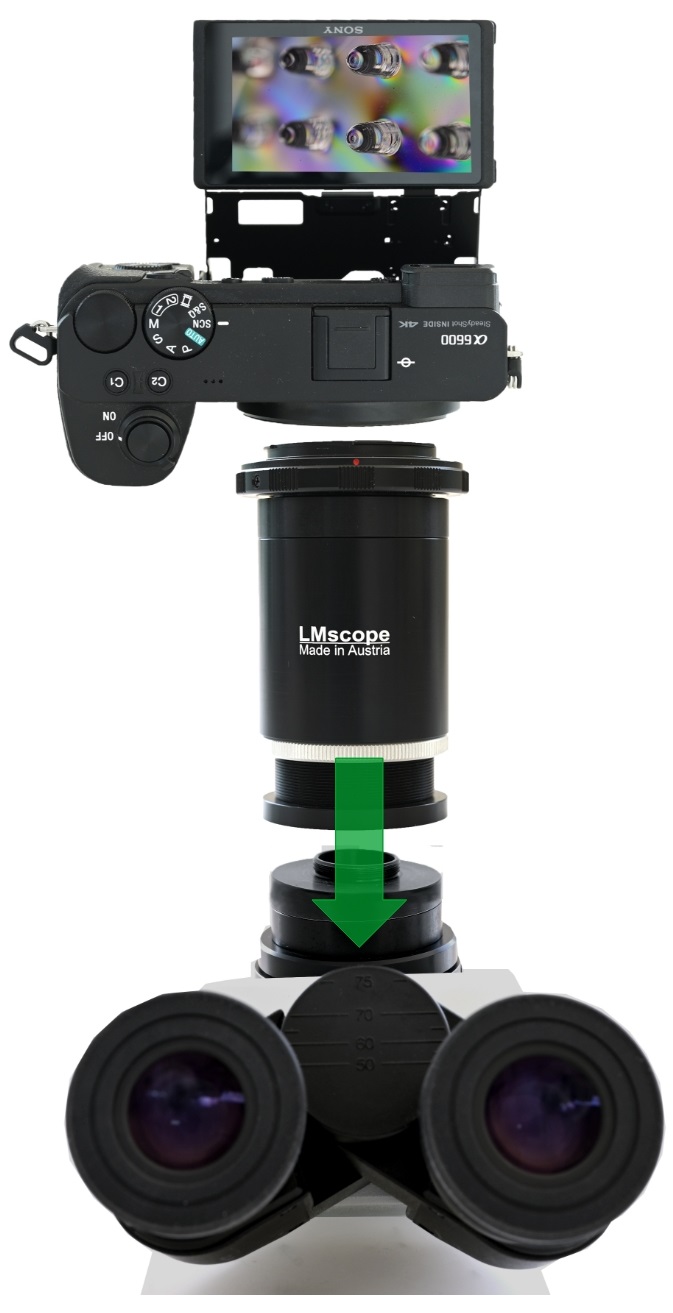
Overview of key features:
- Precision widefield optics for an extra-large field of view (without vignetting)
- Large lens diameter for even more light gathering power
- Very compact, short design
- Universal C-mount connection
- Modular design facilitating maximum flexibility
- Integrated filter holder with M37 thread
- Adapter is focusable (the image observed through the eyepiece can be aligned with that of the phototube)
- Adapter length can be adjusted with 5 mm extender
Designed for professional use, our LM microscope adapters offer a superior level of quality. Thanks to their modular design, coupled with the ability to integrate numerous supplementary modules, they are ideally suited for a wide array of applications. When it comes to camera connections, LM adapters offer unparalleled flexibility, accommodating a wide variety of connections on the camera side. The adapter system is suitable for state-of-the-art mirrorless system cameras, DSLRs, special-purpose microscope cameras, high-speed cameras, industrial cameras, and – with the addition of an optional accessory part – C-Mount cameras. Of course, each system comes complete with the matching bayonet adapter.
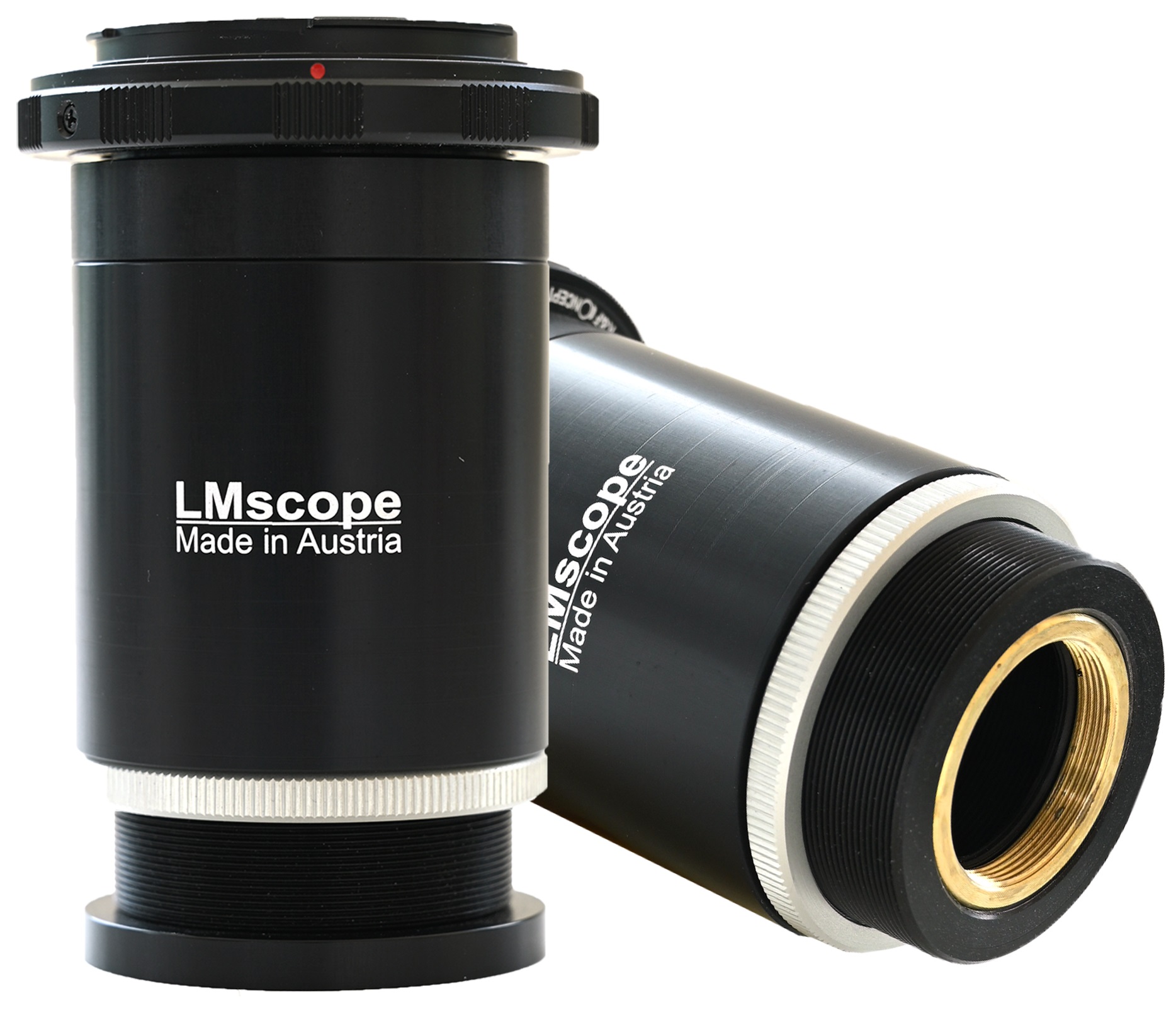
On the microscope side, the adapter solution has a standardised C-mount connection, which means that it can be used on a wide variety of microscopes. To achieve the best possible image quality and field of view, we recommend a C-mount connection with a 1x optical factor. Typically, microscope phototubes with a factor of 1x do not have built-in reduction lenses (0.5x, 0.63x, etc.), which would reduce the field of view. However, it is also possible to attach the adapter solution to C-mount connections with reduction optics.
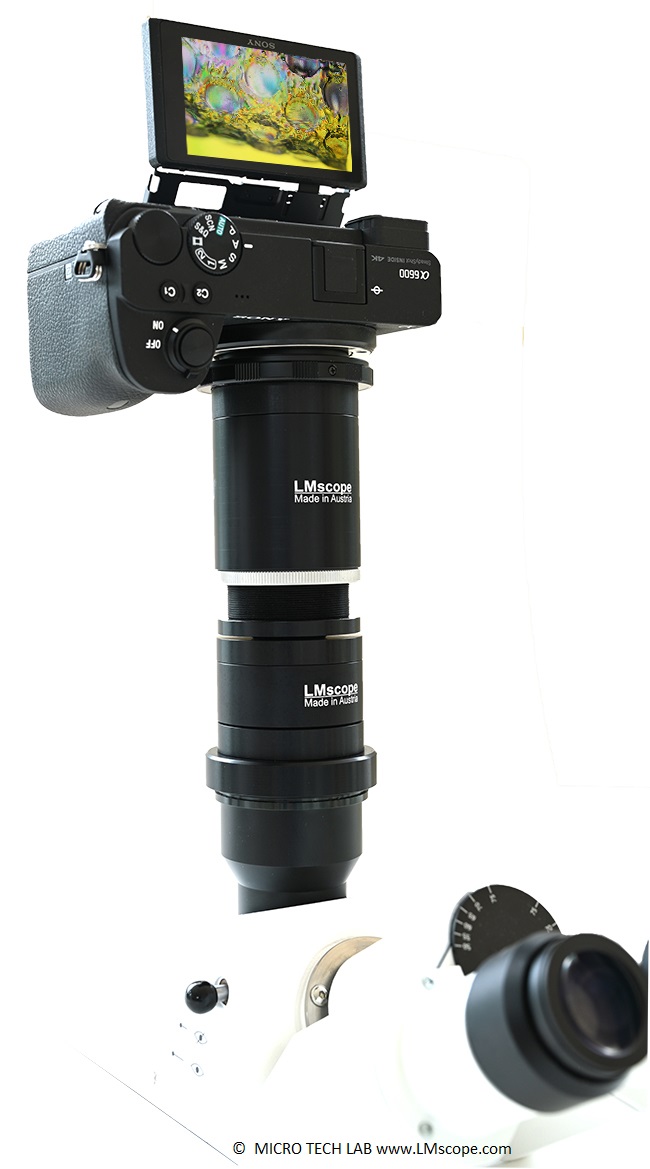
The adapter comes with a filter holder with a 37 mm internal thread as standard.
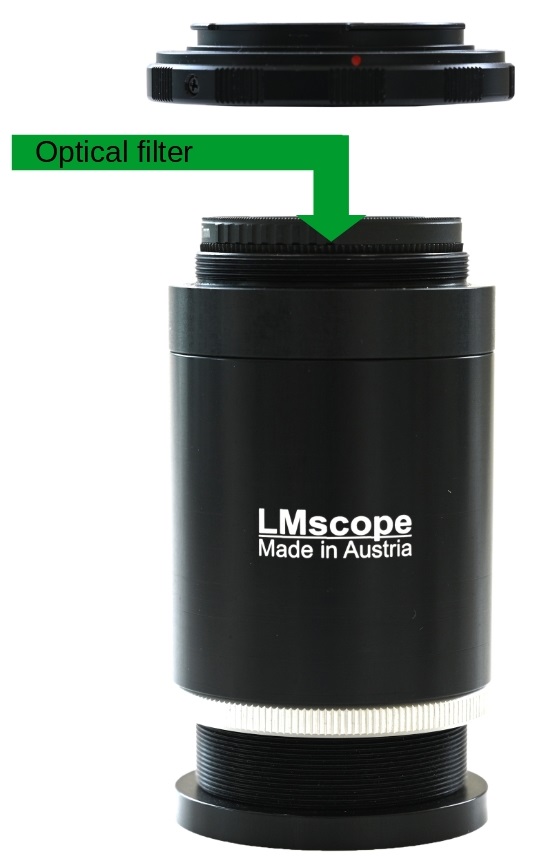
This offers the option of adding optical filters such as polarising filters, colour filters or UV filters in just a few easy steps.
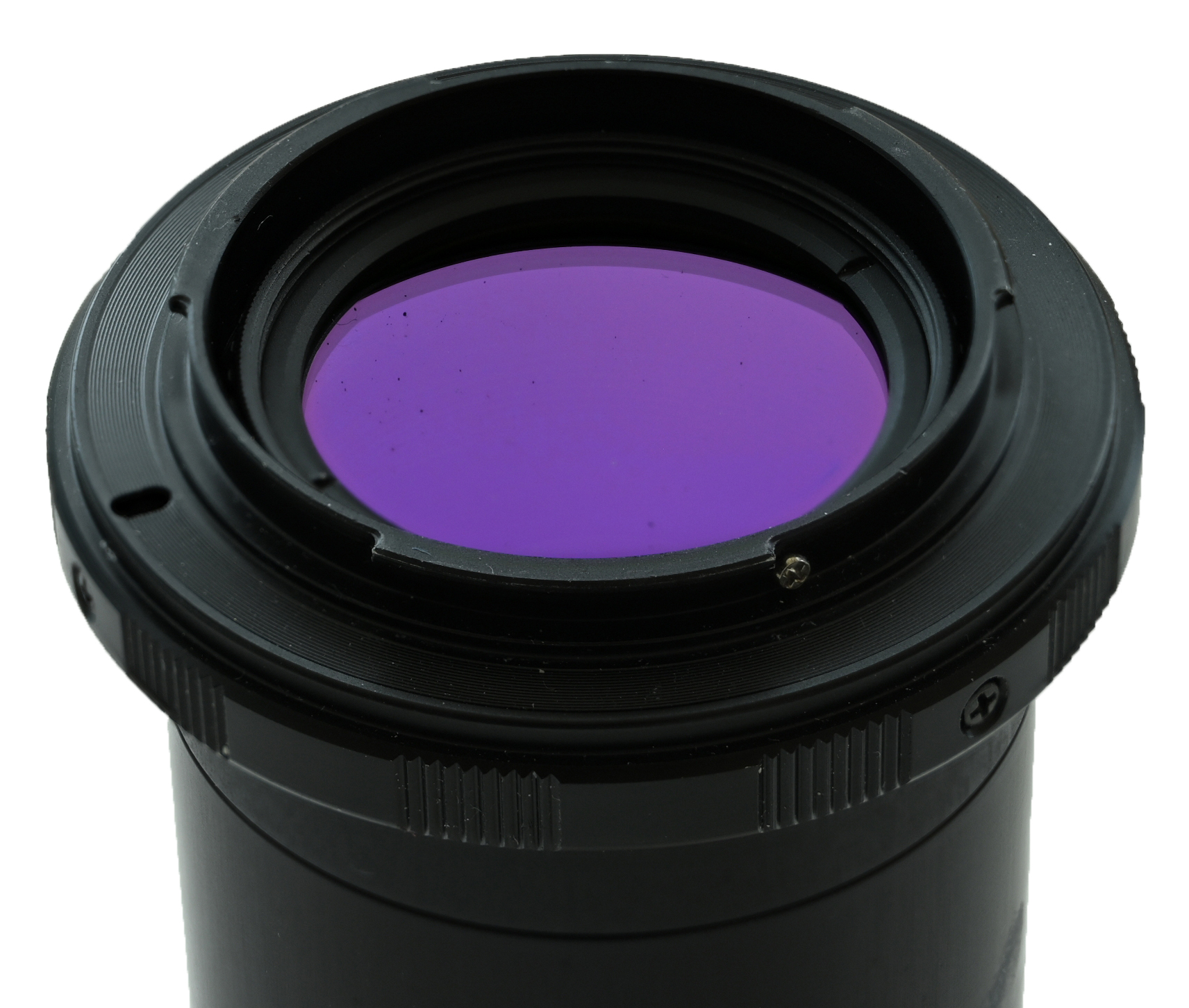
In some cases, microscope users adjust the dioptre settings of their eyepieces. This leads to a loss of parfocality between the camera and the eyepieces: the camera image and the eyepiece image are no longer in focus. To address this issue, our new adapter solution is focusable. To achieve an individual alignment of the camera system, the length of the adapter solution can be changed in order to fine-tune the focus.
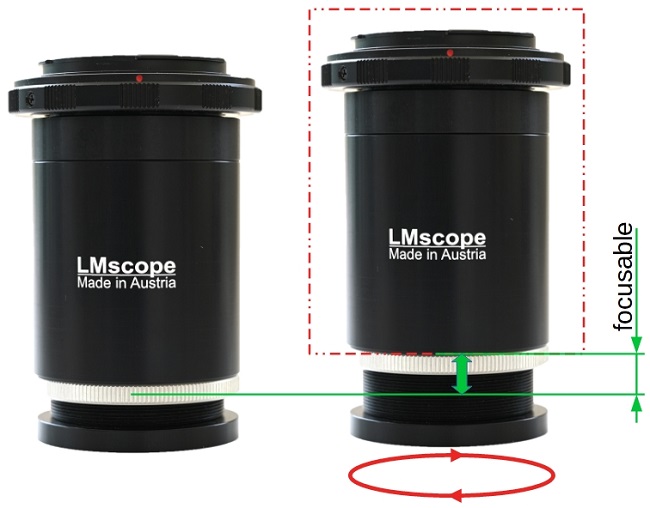
The adapter unit comes with a C-mount 5 mm extender as standard, allowing for a reduction in adapter length or focus distance by 5 mm if required. This facilitates more extensive adjustments.
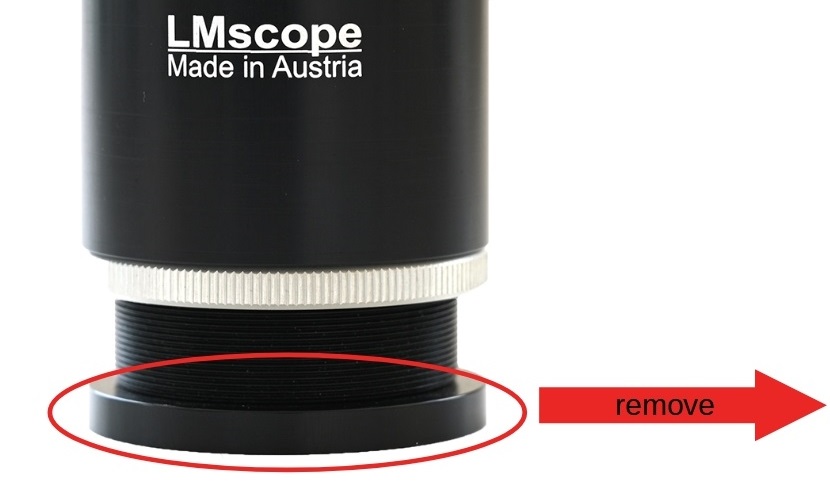
Photography:
Fitting the microscope to digital single-lens reflex (DSLR), mirrorless interchangeable-lens cameras (MILC ), digital single-lens mirrorless (DSLM) or C-mount cameras is easy with our LM digital SLR adapters, which feature a plan achromatic optical system. Our products make it possible to capture top-quality microscope images. To help you select the adapter that is right for your camera, we have set up an online configurator on our website. You can also email us – ideally with attached photographs of your microscope.
Modern DSLR and single-lens mirrorless (DSLM) offer the latest technology and are generally very well suited for microscopy applications. Most of them can be controlled remotely via PC/Mac. Because of their high sales volumes, they offer an excellent price/performance ratio compared to special-purpose microscope cameras.
Features of top DSLR and single-lens mirrorless cameras (DSLM):
- Large, powerful full-frame sensors (36 x 24 mm)
- Sensor resolution of 61 megapixels or 240 megapixels with Pixel Shift technology
- High light sensitivity (ISO 400,000+)
- Extensive dynamic range (up to 15 aperture stops/f-stops)
- Short exposure times (1/8000 second) up to 1/32,000 seconds using the digital shutter
- 4K Ultra HD or 8K Ultra HD video function
- Live video capture on external monitors in ultra HD quality
In most cases, these cameras are significantly more powerful than microscope cameras with smaller sensors (1/2" or 2/3"). On our website you will find our current camera recommendations and a camera ranking which is specifically tailored to microscopy applications.
| Ordering code | Product description | Price | Price | Available |
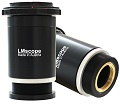 DA17CW | LM digital SLR widefield adapter with anti-reflective coating, plan-achromatic wide-field precision optics with C-mount connection thread, integrated filter holder M37, incl. camera bayonet Data Sheet0 Operating Instructions1 Info2 | Euro 2290,-- | US $ 2564.8 |  |
New LM Digital Adapter for: Sony Alpha 9 III / Nikon Z9 / Nikon Z8 / Sony Alpha 7R V / Sony Alpha 1 II / Sony Alpha 1 / Sony Alpha 9 II (ILCE-9M2) / Sony FX3 Cinema Line / Sony Alpha 9 / Nikon D6 / Canon EOS R3 / Canon EOS R6 Mark II / Canon EOS R8 / Sony Alpha 7R IV / Canon EOS R5 II / Nikon Z6III / Canon EOS R5 / Sony Alpha 7S II / Sony Alpha 7S III / Sony Alpha 7R III / Canon EOS R6 / Nikon Z6 / Nikon Z6II / Sony Alpha 7R II / Nikon Z7 / Nikon Z7II / Canon EOS R / Canon EOS Ra (Astro) / Nikon Z5 / Sony Alpha 7C / Canon EOS RP / Sony Alpha 7S / Canon EOS R7 / Leica SL2-S / Canon EOS R10 / Nikon Z50 II / Canon EOS 1D X Mark III / Nikon Z50 / Nikon Z30 / Nikon Z fc / Nikon D850 / Canon EOS 1D X Mark II / Nikon D780 / Olympus OM-1 / Sony Alpha 7III / Olympus OM-D E-M1 Mark III / Canon EOS R100 / Sony Alpha 6700 / Nikon D5 / Sony Alpha 6600 / Fujifilm X-H2S /